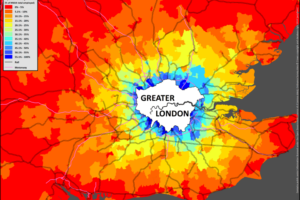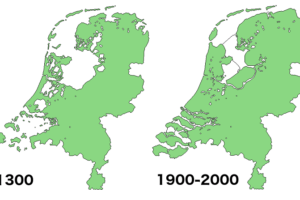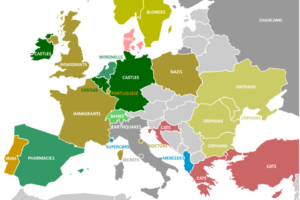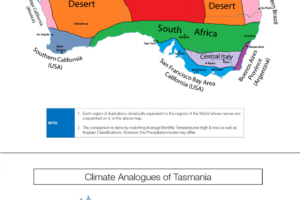The map above shows how many young European adults (25-34) still live at home with their parents. Not surprisingly, there are large North-South and East-West divides. These can likely be explained for two reasons.
First, Mediterranean countries, such as Italy and Greece, have strong family focused societies that don’t have the same stigmas attached to living at home with your parents once you’re an adult.
Second, the financial crisis is likely also partially responsible, since countries that were hit the hardest also saw the biggest rise in those living with their parents.
Based on the data, Slovakia has the highest rate of those still living at home at 56.6%, while Denmark had the lowest rate at just 1.8%. The UK at 14.4% is in the bottom third and only marginally higher than the US (13.9%).
If you find yourself living with parents past age 25 you might some of the following books of interest:
- Under One Roof Again: All Grown Up And (Re)Learning To Live Together Happily
- All in the Family: A Practical Guide to Successful Multigenerational Living
- The Family Tree Historical Maps Book – Europe: A Country-by-Country Atlas of European History, 1700s-1900s
How do you feel about those who live with their parents past age 25? Leave your comments below:









erik smit says
Maybe both protestant religion and economic prosperity are factors that make countries green on this map.
heffeque says
I’d say that it’s interesting how the more religious countries are the ones that have worse economies (independently of the type of religion). The more atheist the country is, the better it prospers (and the less these age groups need to live with their parents).
Jonatan Alsop Beret says
Interesting, but why not this way: the more prosper a socitey gets, the less it relies in religious dogma. I think it does matter the order.
For the sake of my argument I would cite the communist economies (atheist but ruinous), and muslim medieval history (first they got properous, then they relaxed their religious views as Al-Andalus or the Ottoman Empire).
What do you think of it?
heffeque says
We’re both leaving out lots of cultural things that also play a big role in this, but yes, we can agree on what you pointed out 🙂
Pavel says
Czechia ist least religius country for more then a century with second highest rate of mamma-hotels.How can young Czechs built their own homes if thanks to 30 years of “democratic” development under US global leadership are earning 1/3 of German wages and live for 100% of German living costs (incl. real-estates prices)…?!?
Barbara Martin says
Partly, but not only. France is catholic and not especially prosperous and it has a low rate. But it is a social state, like the Scandiniavian countries. It offers young people (and any adult, actually, within certain conditions of revenue) a generous assistance to pay rent (250 euros per month, if I’m not mistaken), which means that only those who prefer to live with their parents do, basically. As for Scandinavian countries, as far as I know, and Denmark in particular, they also offer very generous aides to young people which make them financially independent early on.
Alphaenemy says
i don’t understand why should the taxpayers pay for this??
Ok, so in denmark young students live alone and the government pays for everything. This is stupid, because it’s not possible that there are no people living near the university. I have my university 15 km away, why should i rent a flat?? This is wasting money!!
Lisi Kay Freeman-Alarcón says
Those who live off of their parents post teenagehood all the way into late adult-hood begin to become complacent and believe they are entitled to be spoilt in all other relationships. People should be incentivised to become independent as soon as they hit 25, at least. Of course, in cases of emergency or extreme poverty/injury there are exceptions as to aining for total independence but, honestly the problems begin especially when men start adopting ideas that their girlfriend should take care of them like their mother in a slave-based fashion i.e the self-indulgence of thinking that your parents should care for you like a baby until you die will never incentivise true responsibility into entering manhood. The man then becomes a man-child living off of women.
Both man and a woman should be married with each person contributing just as much as the other where and when possible.
taberenc says
living alone requires a job, that this job includes a salary and that this salary can be used for paying basic needs as a house (at least a room on one) food, clothes, movement requirements ..
In Greece or Spain the unemployment rate is above 25% (higher in some areas). In spain there was also a construccion bubble that made the houses impossible to be paid; while the prices falled, they didnt falled enough in order to keep the economy. so prices are still far too high. And jobs in spain are not like on other places. To begin with, you can have a job and pay for doing it (is called practics period, but they tend to be long, really long) while when you finally get a job with a salary, this salary (if you are lucky on the amount of hours that you can work) uses to be low. As example, on cities like barcelona, an appartment rent is not under 700 € month, while the average salary is around the 900 euros month.. as average, including the very well paid people here.
So no matter the religion factor or the mediterranian family factor: pick an american, a brittish or a sweden, tell him to pay for work, or to be paid for work around 400 or 500 € in the lucky version, and tell him that with that money he should go to live alone on a room on a shared house (of course not an small unequipped appartment for him alone), paying 400 € for that, and tell him that with the rest of the money should live the rest of the month and paying everything else.
Is not a matter of having universitary studies neither. Same issue.
In the other hand, public administration in spain and other mediterranian countries is not at all the same than in uk or u.s. If you dont find a job and decide to be a freelance, you begin by paying around 300€ each month, doesnt matter if you earn money or not, because you are freelancer. So public administration doesnt help neither to change the things.
No, people in southern countries is not dumb nor idiot nor lazy, but why would we let the reality smash a nice picture?
pasabaporaqui says
You’re right, just superimpose this map http://bit.ly/1IYy1IK
Lisi Kay Freeman-Alarcón says
The government needs to incentivise the youth. It is a real shame that the economic system is rigged.
Renata Mikytova says
I am Slovak. I have three adult daughters. Just one of them live with us at weekends as on the week she is living in a youth hostel near the university where she studies. She is saving money from her job to build her own house. The others live in flats – one with her husband, the second shares a flat with three other young women. I think it is not just about economics or religion. Many young people here are not able to be independent from their parents, they do not want to move anywhere else because of work, just stay at home, in a kind of mama hotel, where everything is done by their parents, starting with everyday housework, finishing with money for living. We have a proverb for this situation … “Ostať mame na krku.” (to stay on mum’s neck) what means something like ‘to be cared by mum’.
Pedro says
Somehow who did this map have confused Portugal with Spain.
There’s a Spain culture, apart of a higher % of unemployees, that keep their child at home for a lifetime, even if they are married and whit children, and they are happy with it! Which not happening at all in Portugal. Therefore this numbers cant be accurate with reality.
dvernius says
I think that this is all about the low salary and the high renting prices.
I am 30 and I lived alone for a couple of years, since I finished my master thesis and I could afford it with my (a bit miserable btw) salary.
Don’t try to find any other reasons: People is pretty much the same everywhere, the social and economic rules changes their behaviors.
Andrey Davydov says
If social rules change behaviours, people are not the same everywhere, because the social factors are historical to a large degree. For instance, a major factor in moving away is the social stigma of living with one’s parents, which varies by culture and is difficult to predict using unemployment rates or costly real estate. In one country, you will be regarded as an immature leech who failed at life, whereas in another you will be regarded as normal. In fact, I can see how the former attitude will poison the atmosphere in a household and make it more desirable to move out.
Observe how the title of the article itself attaches a stigma by using the word “still”. That is the equivalent of saying “still unmarried”, as if one simply has to marry at some point and it is a problem that needs to be fixed. Incidentally, wouldn’t one wish to live separately from one’s spouse as well, if one desires greater independence? Surely spouses can be quite bothersome, and people still living together are a sure sign of economic trouble.
Michele Hogan says
I don’t see why the pressure to leave home – or to stay. Can’t cultures be different in the amount of independence/interdependence that is seen as desirable? I lived in Slovakia for 10 years and greatly admired their close, loving, supportive but not suffocating family relationships.
TMCP says
I live in New Zealand, and living with your parents once you leave High School would be hideously embarrassing. You get a wee bit of leeway if you’re at Uni, or if you’re a girl, but other than that- it’s not something you’d want to admit to openly, let’s put it that way. Of course, it varies from city to city and from family to family: a lot of young people from immigrant background still live with their parents, and in some families you’re pretty much expected to move out once you’re 18.
Alphaenemy says
ahahah yes but your parents pay your studies, your flat, i doubt that the majority of the students work and study and are completely independent
If i have a university 15 km from home, why should i move away? i go there by car, stay there for the lectures and for studing later if i have time and then i come back home before lunch. What’s the problem? Should my parents pay 500 euros per month just to say “oh my son lives alone, he’s grown up now!”???
Ruben Remelgado says
moving out and being independent are different concepts. In countries like Germany kids move early away from home. But they still get a heavy financial support from their parents to pay for their basic life costs. So, in a way, this map is very misleading. Makes it seem like central and northern europeans are early emancipated (which is not true in most cases).
Peter Von Lewentz says
Average salary at Slovakia is 700 E. Average rent price is 450E – 550E . No bigger city like Vienna or Prague. 40years of comunistic demagogy an destruction. No oil, no gas, like northern countries. And really lot of us are away from that damned village country in other parts of europe, becouse there is no way how to live like regular Eu citizen. East side of Europe is just Europen china, nothink more 🙂
Martopix says
You forgot Croatia!
aD13N15 says
The map is misleading indeed. Yes, I was surprised many years ago when first visited Slovakia why their houses are so big – three and four storey buildings. So, that’s just a tradition that all generations live under the same roof. It doesn’t mean those 30+ aren’t financially independent from their parents. It’s just a culture and tradition. Same in Poland, especially south.
It’s different in north. But it has nothing to do with crisis or whatever.
Tangier says
The information on this map dependent on culture, financial health of the region, geography, and whether or not you count legal foreign visitors or illegal aliens. Both of the latter live much more densely.
Sarka says
In a way, this might be misleading. Changing address for official documents is not easy in Czechia and you have to run around many offices. Also, you don’t know for how long you will stay in one place before moving. So many people in that age group keep their parent’s address but they don’t live with them anymore. I am the case. I haven’t lived with my parents for years, but I am in that 33.7 % here on the map.
AcG says
In the mediterranean countries it’s purely money. In my country rent is 60% of your monthly income for most young people (and you have to add electricity and water at the very least, which right now is an extra 10-12%, plus transportation) It leaves you with 20% of your salary to eat and buy clothes. I had to share a decrepit apartment with 3 other people until I was 30 just to pay the rent and live on my salary.